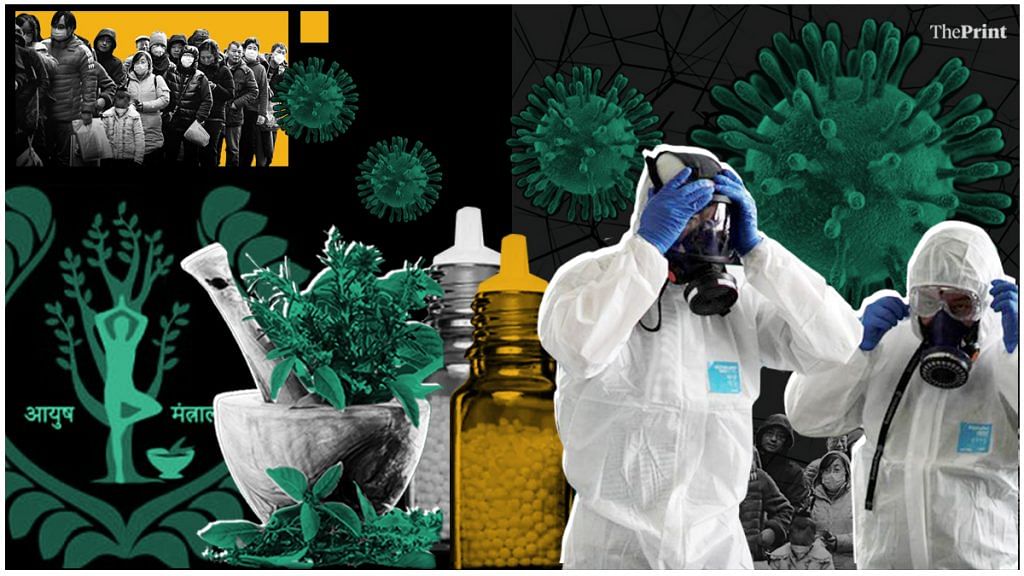AYUSH ministry issued a health advisory Wednesday for the prevention of coronavirus infections through homoeopathy and Ayurveda. It included recommendations such as taking 500 mg of samshamani vati twice a day and putting two drops of sesame oil in each nostril every morning. India is now among the countries which are at ‘high risk’ from virus outbreak.
ThePrint asks: Homoeopathy for coronavirus: Is AYUSH commitment to alt meds healthy or promoting quackery?
Homoeopathy should not be treated as an alternative to ‘western medicine’
Former health secretary
When it comes to a public health crisis, there is no time to waste. I believe the coronavirus is a matter of great concern, considering the Director General of WHO recently called on Chinese President Xi Jinping.
On AYUSH’s latest advisory on coronavirus, I will say that homoeopathy practitioners are free to work and prescribe medicines within their framework. AYUSH training institutions, whether it’s those in Uttar Pradesh that specialise in Ayurveda and Unani or those in Tamil Nadu that specialise in Siddha, are meant to develop a workforce that operates strictly within their authorisation. Also, patients coming to AYUSH practitioners should specifically seek AYUSH remedies. Homoeopathy should not be treated as an alternative to ‘western medicine’ as outlined in the Medical Council Act, 1956. Also, it’s a bit early to say that the AYUSH advisory is the Narendra Modi government’s only response.
I believe we should not wait to see how the coronavirus epidemic snowballs. I’m sure the Directorate General of Health Services under the Ministry of Health has sounded all the alarm bells and is committed to evacuating Indians from China and putting in place a system for their entry in India.
Homoeopathy research remains a waste of tax-payers’ money and should not be a part of public healthcare
Neuroscientist, author and Editor, AltNews
Homoeopathy is the least scientific among various forms of alternative therapies. It has no evidence of treating major disorders, including the latest threat of coronavirus infections. Reviews of research conducted by homoeopaths have revealed data manipulations, overstretching of results, and statistical frauds to conclude their efficacy. The research has not only been found to be of sub-quality and inconsistent with the mechanisms of evidence-based drug research, but also difficult to replicate in large-scale studies.
Evidence-based medicine takes years, if not decades, to develop. Alternative treatments for newly found diseases emerge with claims of treating them within days or weeks, the microscopic structure of the virus was not found until 1931.
Homoeopathy research remains a waste of tax-payers’ money and should not be a part of public healthcare. Its drug packaging in the market should include appropriate labelling of any evidence (rather a lack of) reported in its research studies.
Moreover, government platforms suggesting the use of homoeopathy during a deadly pandemic is nothing short of irresponsible. While governments in the West are excluding homoeopathy from public health, India has been consistently adding value to it and other alternative drugs that have little scientific evidence to support their claims.
AYUSH’s suggestion of applying homoeopathy to patients infected by coronavirus not premature
Secretary General, Homoeopathic Medical Association of India
Homoeopathy is not quackery and has had a long tradition of preventive support for all types of infections. It even played a significant role in the 1980 influenza epidemic.
The exact clinical picture of coronavirus is missing as of now, which means comprehensive examinations and studies of its severity are of extreme necessity. However, this is a job for clinical laboratories that risk a patient’s life for the sake of research. The world has pumped in a lot of time and money into studying patients with diseases like AIDS and yet they remain incurable.
Homoeopathy serves not just as a preventive measure, but as a simultaneous process of studying a patient’s symptoms and treating them effectively. It focuses on symptoms that function as reflections of the internal disease. So, it is not premature to apply homoeopathy to patients infected by coronavirus, even though it is a new and relatively unknown virus. Homoeopathy is scientific.
Homoeopathy takes a holistic approach to study a patient’s experience with the disease and observations noted by relatives. It also derives common ‘bases’ between patients and considers the chronology of symptoms. Only then a remedy is put forth. AYUSH’s advisory on preventing coronavirus may appear generic, but they are the fundamentals of hygiene and maintaining an immune system that can fight such dangerous diseases.
AYUSH is promoting quackery. Any preventive scientific method has to follow certain basic standards
Secretary General, Indian Medical Association
AYUSH is promoting quackery in its latest advisory on preventing coronavirus. While I do believe that Ayurveda and other forms of naturopathy are an integral part of the history of medicine, modern medicine is more transparent and understands its limitations. We remain responsible for what we say and advise.
Any preventive scientific method has to follow certain basic standards. A simple vaccine, for example, must undergo a double-blind test in order to reproduce results in an unbiased manner. Homoeopathy does not follow standard protocols and most of its methods are based on surmises.
Medicine and its different systems have evolved over centuries. Advances in modern medicine are transparent and in public domain. The same cannot be said about others. They need to evaluate their advances from ancient concepts. If a medical discipline lacks basic pharmacopoeia and is not transparent about the possible side effects of a particular drug, then it is not scientific.
I think the reason India has the world’s largest administrative framework for homoeopathy is that we as a nation need to work on our scientific temperament.
Also read: Economist, Soros: Has Hindu nationalism increased global criticism of India or bad economy?
By Pia Krishnankutty, journalist with ThePrint
